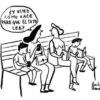
I have chosen to address this topic because among the many questions and doubts that arise regarding the education and upbringing of your children, there is one that is repeated a lot in our classrooms and is ultimately the most frequent: do our children behave differently here, at school, than they do at home? The answer is generally yes.
At school, for logistical reasons, it is necessary to establish a work rhythm, establish routines, create habits and set limits. Something that is often more difficult at home.
In the meetings I hold at the beginning of the school year with the parents of my students, I talk to them about the importance of establishing rhythms in the daily life of their children; young children do not have the notion of time as we adults do; and it is the routines and habits that we establish, which allow them to situate themselves in space and time. Without this, they are disoriented and this, in most cases, generates frustration.
At home, sometimes, we have doubts about how to establish these routines, create habits and set limits and that is when we forget that this is an essential part in the education of our children; and so we wonder why here he does not sleep alone and at school yes? Why here he does not want to eat anything and at school he eats everything? Why he does not pay attention and at school…? At school neither daddies, they are children!
We spend the day working and struggling to achieve the best for them and on many occasions we forget that it is important to dedicate a large part of our time to them. When we forget that, they take care of reminding us with their attention calls and ultimately with their attitude. We know that our presence is fundamental; moments of playing, singing, dancing, laughing, painting, cooking, staining… and also educating.
Educating them implies teaching them values such as companionship, respect for people, animals and nature, the ability to empathize, share, care, love…. and also to set limits. If they make mistakes, we are the ones who must correct those behaviors that do not seem right to us. And this, of course, is not incompatible with love. But also, in order to educate, we must remove from ourselves the feeling of guilt; the fact that we have to spend the whole day working and not being able to dedicate all the time we would like to, does not imply at all that when we come back we have to please them with everything they want.
When I talk about limits, I want you all to understand that setting limits is not something negative. Setting limits is not limiting. The child as a child must experience and discover their world in many different ways during the first years of life. They have to touch, suck, search, pull, tear, break, dirty, climb and a long etcetera that will allow them to develop as individuals. But if climbing is dangerous, we must set limits, if sucking may cause choking, we must set limits, if breaking may cause harm to themselves or to anyone else, we must set limits…
Boundaries are necessary and even if they make them angry, they will eventually discover that every time we set a boundary it was also a way of giving them love.
Limits as well as routines also provide them with security, a security that the adult, the protective figure is always there to say how far, they need that even if it is hard to believe.
Just a word of caution: If we overstep our boundaries with their well-being in mind, we may cross the fine line between protection and overprotection.
If we limit them so much that they are not able to develop, we are not favoring their evolution; as everything in life, we must be able to find the middle ground. We cannot hinder their evolution and development because of our fears, fears and/or doubts.
Finally, I want to share with you something that alludes to respect, to not judge anyone and to take for granted something that should be so, and that is that every parent always wants the best for their children, each one manages the upbringing of their child as best they know how and/or can. It is circulating on social networks and is a text that appeared on the door of a pediatrician’s office.
The best is not the breast.
The best thing is not the bottle either,
The best thing to do is not to take it,
The best thing to do is not to stop taking it.
The best thing to do is not to knock it down like that.
The best thing to do is not to knock it down in this other way either.
The best thing to do is not to cover it in one way.
The best thing to do is not to cover it the other way either.
The best thing to do is not to wrap it with this.
The best thing is not to wrap it with that either.
The best thing to do is not to give him purees.
The best thing is not to give it pieces either.
The best thing is not what your mother says.
The best thing is also not what your friend says.
The best thing is not to be with a nanny.
The best thing is also not to go to daycare or stay with grandparents.
It is best not to follow this type of parenting.
Nor is it best to follow another style of parenting.
Do you know what the best really is? The best is you.
The best is what makes you feel the best.
The best thing to do is what your instinct tells you is best.
The best is what helps you to be well too.
The best is what makes you happy with your family.
Because if you are well, they get the best, because the best is you.
Because if you feel safe, they feel safe too.
Because if you believe you are doing well, your peace of mind and happiness reaches them. Because the best is you.
Let’s stop telling every parent what’s best because what’s really best for your kids is you.”
As the title of this article states, educating is sometimes very difficult but it is so beautiful… that both professionally and personally, it is clear to me that it is something I will continue to do for a long time.
Thank you daddies, because all this arises from your doubts, your consultations and the unconditional love you show for your children day after day.
Aroa Vicente López, Educator CEI Hormiguitas.








